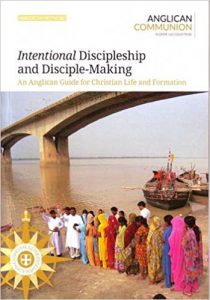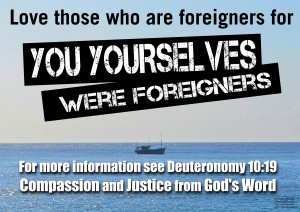Review: Intentional Discipleship and Disciple-Making – An Anglican Guide for Christian Life and Formation
 The word “discipleship” has become such a buzzword in recent years that when it is used, particularly in official documents or vision statements, it’s intended meaning is not always certain.
The word “discipleship” has become such a buzzword in recent years that when it is used, particularly in official documents or vision statements, it’s intended meaning is not always certain.
I have a vested interest in pursuing discipleship in an Anglican context. It is useful, therefore, to familiarise myself with how discipleship is being understood, talked about, and promoted. Practical on-the-ground examples are the most valuable. But perspectives from the heights of the institution are also important. Last year’s Archbishops’ Council report, Setting God’s People Free pointed out that the main obstacle to discipleship is cultural intransigence. Sometimes it is possible for papers at the top to cut across the lower tides of avoidance; they can simply state what needs to be stated, even if their immediate effect is not obvious.
This small book, published by the Anglican Consultative Council in 2016, is a case in point. It is a Communion-level, globally-scoped report. It brings some important insights, especially from the Global South. I’m finding it invaluable as I prepare some thoughts on discipleship for our Deanery strategic planning process.
It is available for download in pdf.
One of the ways we avoid a discipleship culture is by subsuming the term into our existing church culture, rather than allowing it to provoke much-needed adaptive change. That is, we undertake “discipleship activities” or, worse yet, we simply shoehorn the word “discipleship” into the description of our existing activities, and we quench the Spirit. In the end, discipleship is about being a disciple/student/follower of Jesus himself. If we think we can do that and remain unchanged. If we think we can avoid having our “self-identity” challenged (page 5), we are deluding ourselves. Yet we try.
Archbishop Ng Moon Hing of South East Asia addresses this symptom from the very beginning, in his foreword:
To follow Jesus of Nazareth into his cosmic reign is simply the most challenging, the most beautiful, the most costly, the most rewarding journey we could ever choose to begin… our following Jesus requires much more than the latest course or introduction to Christian living. Courses have their place… but our apostleship, our discipleship demands much more – in fact it demands everything. (Page vii)
A definition of discipleship is needed for this book to make any sense. The definition it gives is not so much provided as located; discipleship “encompasses this total God-ward transformation which takes place when individuals and communities intentionally, sacrificially, and consistently live every aspect of their daily life in commitment to following Jesus Christ” (Page 4).
This is a wonderfully Anglican way of doing it: Discipleship is not so delicately defined that it adheres to one time or place, but it is bounded so that we know what we’re talking about.
It is also wonderfully Anglican to begin from the basis of biblical theology. Discipleship themes are quickly traced through the Old Testament before focusing on Jesus himself, with his “group of ‘learners’ who were selected to be with him” (page 11). The book does well to go beyond the prosaic picture of Jesus merely as pedagogical examplar, as if Jesus is defined by his discipleship methods. Rather, the fundamentals of Christ’s person and mission are first and foremost. It is discipleship that is defined by Jesus, not the other way around. Therefore, true discipleship bears the mark of the cross. It is much more than a spiritualised self-help program, “much more than belief and personal growth in Christian character” (page 16):
For the original twelve there was a literal journey following Jesus up from Galilee into the eye of the storm, Jerusalem – a journey marked with misguided hopes and some trepidation…: we are all on a journey, following Jesus… we are to leave things behind… we are to trust him both for our eventual arrival in the city and also for the surprising details along the way and through the desert; above all, we are to ‘take up [our] cross daily’ and follow Jesus (Lk 9.23) (Page 15)
From this biblical starting point, we are taken through a cursory look at discipleship in the early and historical church and arrive at a multi-faceted examination in recent and contemporary Christianity. Like the charismatic renewals of that latter 20th Century, there appears to be evidence of similarly transdenominational currents in this area. I find this encouraging.
Consequently, this book has stimulated my thinking. For instance, there is a harmony in discipleship between separation (as in the monastic tradition of withdrawing from “the accommodation of Christian communities to the ways of the secular world” (page 35), or the Latin American emphasis (page 101) on “preparing Christ’s disciples to act differently”), and missional engagement that connects with and promotes a relevant gospel. Popular evangelicalism lacks the language to tackle this.
For instance, I found myself unexpectedly pushing back at how we describe secular “work and other human activities as a form of vocation” (page 65). It’s not that I disagree that secular work is vocational. Nor do I wish to slip into some sort of clericalism that elevates church work as somehow spiritually superior. It’s just that the language does not prevent an apparent lack of distinctiveness in the pursuit of vocation. The consequence is our propensity to sacralise all work and so fall into the careerism of our surrounding culture; to assert the divine right to pursue the career of my choice. Rather, the journey of discipleship necessarily moves us away from careerism; it may take us on either path of secular work or ecclesial ministry, (if we need to make the distinction at all), but whatever it is, whatever we do, it is to be submitted to the call of Christ. Our career is first and foremost shaped by our vocation, our discipleship, and not the other way around.
This book has stirred my consideration of practice. The way it draws on the experiences of discipleship in various parts of the world and diverse cultures is stimulating. The common threads recognise that discipleship is holistic, communal, missional, and deliberate. Jesus is the beginning and the end.
Churches should be assemblies of disciples of Christ and not pew-warming believers. All sermons should be discipleship-driven and not entertain spectators with feel-good sensation. Christ’s death is costly, and it would be considered worthy if he knew that his life was laid down for people who became his disciples. It would be sad for him if he knew that it is for pew-warmer Christians. A disciple of Christ will ask, ‘What and how shall I serve and live for Christ?’ A pew-warmer believer will ask, ‘What will Christ do for me?’ (Page 89)
These experiences are wells to draw from. They help us get to some practicalities without becoming programmatic.
For instance, the importance of cultural analysis is present in the reflection from the Middle East. Cultural self-awareness is something that can be learned and practised. It is a skill that is sadly missing in much of the Western Church, an aspect of our normative missional illiteracy. The book speaks of “an adventure for the ‘disciple-maker’ as for the ‘disciple’… discovering where the Spirit of God applauds the norms of our culture, where he accepts some norms as a fair enough starting point and where he says ‘not good enough!’ about them” (page 91). Similarly, the cultural questions posed by “insider movements” (page 120) poses important cultural questions that can and should be more readily asked; we are all inside a culture.
The practical importance of relational and emotional courage is present in the reflection from Latin America. This pushes back at the Western tendency (or perhaps it’s British?) to confuse harmony with polite silence and emotional avoidance. This lesson moves away from an attitude of “waiting for someone else to solve [the] problem.” Drawing upon the lessons of the Road to Emmaus, it speaks of the importance of the final movement back “to Jerusalem – to community, joy, dynamism, but also to the conflicts, to the Cross… to the crises” (page 102).
There is one significant weakness, a gap that is almost bewildering: Despite the brief acknowledgement of the “importance of the parents’ role in teaching each new generation to walk in the ways of the Lord” (page 9, see also page 68), there is very little at all on the place of family, children and youth. The one perfunctory chapter (page 107) is insufficient. A discipleship culture is inherently intergenerational and that characteristic deserves more engagement. Our prevailing habit in the Western church of splitting the Body of Christ into homogenous age brackets is fundamentally antagonistic to Christ’s heart for mission. A failure to engage with that diminishes this book.
Nevertheless, the book’s ambition is valuable: It is fundamentally vocational. i.e it issues a call that is coherent across all Anglican contexts. Without whitewashing the “rich diversity in the understanding and practice of discipleship and disciple-making” (page 3), it nevertheless affirms a “strong intentionality” and lays it before us: “…the Church needs to be called back to its roots as a community of disciples who make disciples.”
It is therefore yet another resonance to the growing prophetic voice caling for a shift in culture. More voices are still needed.

 Gill and I had a wonderful opportunity to be in Canterbury last week. Canterbury Cathedral had made a “Canterbury Cross” for our former church,
Gill and I had a wonderful opportunity to be in Canterbury last week. Canterbury Cathedral had made a “Canterbury Cross” for our former church, 

